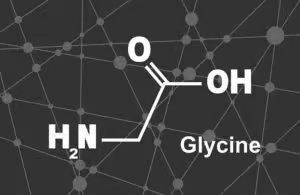Table of Contents
Glycine (2-Aminoacetic Acid, Gly, G) is a conditionally essential amino acid and neurotransmitter. The simplest of all amino acids, glycine plays a role in the synthesis of nucleic acids, glutathione, RNA and DNA, and creatine.[i]
Glycine is synthesized in your body from threonine (through threonine dehydrogenase pathway), choline (via formation of sarcosine), and serine (through serine hydroxy methyltransferase [SHMT]).[ii]
Glycine is considered a “conditionally essential” amino acid because your body cannot produce enough on its own. So, the remainder must be obtained from foods like meat, fish, dairy, legumes, or supplements.[iii]
Glycine plays a critical role as a neurotransmitter because it controls your intake of food, behavior, and complete body homeostasis.
It can be both excitatory and inhibitory. Which means that it can stimulate your brain and nervous system, as well as quieten it.
Supplementing with glycine has been shown to effective in treating metabolic disorders, inflammatory disease, obesity, cancers, and diabetes.
Here we’ll investigate as a nootropic for enhancing sleep quality and brain function.
Glycine helps:
- Sleep: Glycine helps you fall asleep more quickly, reduce insomnia, improve sleep quality, and promote deeper and more restful sleep
- Neurological disorders: Glycine has been shown to be effective in those dealing with schizophrenia, OCD, and depression.
- Stroke: Patients who have suffered ischemic stroke (brain ischemia or cerebral ischemia), are given glycine orally to help limit damage to the brain within the first six hours of the stroke.
What is Glycine?
Glycine (2-Aminoacetic Acid, Gly, G) is one of the most important amino acids in your body. It helps in regulation of cardiovascular, cognitive, and metabolic health.
 The name Glycine comes from the Greek word γλυκύς “sweet tasting“.
The name Glycine comes from the Greek word γλυκύς “sweet tasting“.
Glycine was discovered in 1829 by French chemist Henri Braconnot after boiling gelatin with sulphuric acid. And since then, it has been manufactured and distributed commercially as a sweetener, and as a buffering agent for antacids.
Glycine is also a sweet and colorless crystal that is synthesized in your body from choline, threonine, and serine.
As a therapeutic and nootropic supplement provides multiple benefits to human health.
Glycine has been shown to be effective for improving skin elasticity. And collagen peptide which is loaded with Glycine helps suppress sun-induced skin damage and reduce wrinkles around the eyes.[iv]
Glycine supplementation helps reduce the symptoms of schizophrenia.[v] It helps reduce symptoms of OCD. And low blood levels of glycine have been associated with depression.
Numerous studies have also shown glycine’s potential in improving sleep, enhancing memory, and increasing insulin sensitivity.
Glycine modulates inhibitory neurotransmitters via glycine receptors throughout the central nervous system.[vi] And potentiates NMDA receptors which provides an excitatory response.[vii] Affecting cognition, mood, immune function, and sleep.
How does Glycine work in the brain?
Glycine boosts brain health and function in several ways. But two in particular stand out.
- For sleep – Numerous studies have shown that glycine influences the quality of sleep, reduces insomnia, and promotes restful sleep. It does this in a couple of ways.
Glycine has a particular affinity for NMDA receptors and glycine receptors. Which results in increased peripheral blood flow, and a subsequent drop in the core body temperature.
In other words, glycine works to improve blood flow to the body’s extremities, which in turn reduces core body temperature.
This decrease in body temperature plays an important part of sleep induction since the onset of sleep is associated with lowered body temperature. Which then progresses to deep sleep.
Researchers demonstrated this in an animal study showing how glycine triggered a drop in body temperature which helped the study subjects fall asleep more quickly And spend more time in REM sleep. [viii]
The study also showed that glycine can help you experience deep, slow wave sleep more quickly.
Glycine has also been shown to increase the production of serotonin in the brain. Which helps sleep because serotonin aids in the synthesis of the sleep hormone melatonin.[ix]
Studies also suggest that glycine can help you get back to your regular sleep cycles after a period of a disrupted sleep schedule.[x]
- Schizophrenia – Glycine has shown promising results in reducing the symptoms of depression, OCD, anxiety, and bipolar disorder. However, its most pronounced efficacy is seen in the reduction of schizophrenia symptoms.
Post mortem evaluations of the brains of people with schizophrenia have shown fewer NMDA receptors compared to those who did not have the disease.
Researchers also found decreased levels of glycine in both the blood and cerebrospinal fluid of people with schizophrenia.[xi]
Glycine is known to be an NMDA agonist. It is well tolerated by the patients in both short-, and long-term treatment.
To date, numerous studies have been conducted to evaluate the efficacy of glycine in treating schizophrenia.
The first controlled trial used a glycine dose of 15 grams per day which showed significant improvement during glycine treatment.
Another study, 21 schizophrenic patients were given high doses of glycine in addition to antipsychotic treatment.
A significant 34% reduction in negative symptoms was observed during glycine treatment. And the study authors noted the improvement persisted even after patients stopped supplementing with glycine. [xii]
 How things go bad
How things go bad
Sleep deprivation or the inability to get a good night’s sleep is an increasing concern world-wide. Not enough sleep or poor sleep quality can result in:
↓ Memory loss
↓ Inability to concentrate
↓ Poor metabolism
↑ Weight gain
↑ Irritability
↑ High blood pressure
↑ High blood sugar levels
↓ Low sex drive
↑ Risk of heart disease
Glycine as a nootropic supplement helps the body make serotonin which improves sleep and mood. And it influences key receptors in the brain resulting in better learning and memory.[xiii] [xiv]
Low glycine levels in the body are also linked to depression.[xv]
 Glycine benefits
Glycine benefits
Glycine activates NMDA receptors in the brain and restores serotonin levels which helps improve sleep. And the ability to fall asleep faster.
In one study, 15 adult females were given either a placebo or 3 grams of glycine before bed.
The study concluded that supplementing with glycine showed a significant improvement in reduced fatigue, liveliness, and clear-headedness the next morning.[xvi]
Glycine helps brain cell signaling which boosts cognition, memory and mood.
Glycine taken in high doses has proven to be highly effective in reducing the symptoms of schizophrenia.
It helps with depression and mental fluency associated with schizophrenia.
And may improve psychotic symptoms as well.[xvii]
Evidence also suggests that glycine assists with depression and neurodegenerative diseases such as Alzheimer’s and Huntington’s.
Glycine also showed a protective effect against neurological damage associated with stroke.[xviii]
And research suggests improvements in memory, recall, and sustained attention in those supplementing with glycine as a nootropic.
How does Glycine feel?
People who take high quality glycine supplements report better sleep quality, and improved mood during the day.
Some users say they felt more balanced and livelier once they started supplementing with glycine.
Glycine is best taken 60 minutes before bed. Most users report a minimum of 7 hours of undisturbed, high quality sleep.
Glycine helps even chronic insomniacs fall asleep easily.
Unlike most sleep inducers, glycine does not leave you feeling groggy and fatigued in the morning. On the contrary, users wake up feeling rested and ready to tackle the day.
Glycine is a good joint health supplement. Because it aids in cartilage regeneration by enhancing collagen re-synthesis.
Glycine may also provide relief from night sweats for pre-menopausal and menopausal women.
 Glycine Clinical Research
Glycine Clinical Research
Glycine for schizophrenia
22 schizophrenic patients who were treatment-resistant took part in a double blind, placebo-controlled trial. They were administered 0.8g/kg per day of glycine along with their antipsychotic medication.
Clinical assessments were performed bi-weekly. The group who was administered glycine showed a 24-46% reduction in negative symptoms. [xix]
In another double-blind, placebo-controlled study, 14 medicated patients with chronic schizophrenia were treated with glycine. The results showed a significant improvement in negative symptoms in the group that was given glycine but not in the group given placebo. [xx]
Glycine for sleep
In a randomized placebo-controlled trial, 11 healthy adults were given either 3 grams of glycine or a placebo 1 hour before bed for 2 days. The results indicated quicker sleep onset followed by long, restful sleep.[xxi]
In 2012, another placebo-controlled study recruited healthy adults who were restricted to 25% less sleep than normal. Study subjects were given either a placebo or 3 grams of glycine before bed.
In subjects given glycine, the data showed a significant reduction in fatigue often related to reduced sleep.[xxii]
Glycine for learning and memory
Scientists studied the effects of bioglycin, a biologically active form of glycine in healthy students (mean age 20.7 years), and middle-aged men (mean age, 58.9 years).
The researchers specifically measured attention, memory, and mood using a double-blind, randomized design. [xxiii]
The results indicated that bioglycin significantly improved episodic memory in both the young and middle-aged group. And the middle-aged group also showed a significant improvement in the sustained-attention task.
Glycine Recommended Dosage
 Recommended nootropic dosage of Glycine is 3 grams per day.
Recommended nootropic dosage of Glycine is 3 grams per day.
Experts recommend a Glycine dosage of 0.4 grams per kilogram of body weight (g/kg) twice daily when taking an atypical antipsychotic like Zyprexa and Risperdal.
Many human trials have safely used glycine doses of 1 g (1000 mg) per day for supporting brain health after a stroke. And up to 50 grams per day for schizophrenia.
Most Glycine supplements come in 1000 mg capsules. And the most effective dose is reported to be 3 grams 60 minutes before bed.
Glycine Side Effects
Glycine supplements are generally considered non-toxic and safe with few side effects in most people.
However, supplementing with 9 grams or more of Glycine may result in mild gastrointestinal symptoms such as an upset stomach, nausea, loose stools, or vomiting.
Slight sedation is also a possible side effect of taking glycine.
Do not take glycine if you are on the antipsychotic drug Clozaril (clozapine). Unlike other drugs used to treat schizophrenia, glycine appears to decrease the effectiveness of Clozaril in some people.[xxiv]
Do not use glycine if you are suffering from diarrhea, as it may worsen the condition.
Due to lack of sufficient research, glycine should be avoided by breastfeeding and pregnant women unless prescribed by a physician.
Type of Glycine to Buy
Glycine is available in 1000 mg capsules, 500 mg tablets, and as powder.
Look for a Glycine supplement with zero “other ingredients”.
Avoid Glycine supplements containing additives such as silicon dioxide, stearic acid, or magnesium stearate.
I recommend: Click for Life Extension – Glycine because it is pure.
Nootropics Expert® Recommendation
I recommend Glycine as a nootropic supplement.
Your body makes some Glycine during the day. But you need more Glycine than your body can produce on its own. So, you must get it from food or a nootropic supplement.
Glycine is particularly effective in those dealing with sleep disorders or insomnia.
Supplementing with Glycine should provide a good night’s sleep. And have you feeling well-rested the next morning.
Glycine has been shown to be effective in those dealing with schizophrenia. Even while using most regular medications used with this disorder.
But please, if you are dealing with schizophrenia, check with your doctor before using this nootropic.
Glycine as a nootropic supplement used at recommended dosages is non-toxic and safe for most people with little or no side effects.
3 grams of Glycine seems to be most effective for most people taken about 60 minutes before bed.
I recommend: Click for Life Extension – Glycine because it is pure.








Join The Discussion - 152 comments
Raju
July 16, 2021
Hi David, I personally appreciate your content. Great work. I would like to know more about this line “Evidence also suggests that glycine assists with depression and neurodegenerative diseases such as Alzheimer’s and Huntington’s”. Particularly in Huntington’s, there is NMDA receptor-mediated excitotoxicity, and studies found to have high glycine in the CSF of HD. In that case, how did glycine can help in HD? What could be the possible mechanism? If you have any references to the evidence please share.
David Tomen
July 21, 2021
Raju, according to this: https://pubmed.ncbi.nlm.nih.gov/9168841/ a there is a lack of glycine receptor binding sites at the glutamate/NMDA receptor. Lack of binding sites would cause extra-cellular glycine to be floating around looking for something to bind to is my guess.
Stephanie
May 25, 2021
I’ve been taking Tart cherry, L Tryptophan and Magnesium with good results after reading your post on sleep supplements. Would it be okay to add Glycine?
David Tomen
May 25, 2021
Absolutely yes.
Serge
March 28, 2021
Hello David
Does glycine has effect on ED?
Thanks
David Tomen
March 28, 2021
Serge, not as far as I can tell. Unless I missed something along the way.
Jesse
March 22, 2021
So I’ve been trying to put together a good stack to help restore Gaba function and receptors GABA in the brain among other things
Taurine – 500MG
Glycine 500MG – 1000
Lemon Balm – 500MG
Taking in evening 3 hours before bed
In the morning when I wake up
Bio-Curcumin BCM-95 – 400MG
Acetyl-L-Carnitine – 500MG
DHA – 1000MG
Is this a good and safe stack for daily consumption
David Tomen
March 23, 2021
Jesse, your stack is certainly safe. You may want to consider doing a 2nd noon dose of Curcumin and ALCAR.
Jesse
March 24, 2021
okay one quick last question on Glycine, can you overdo it say I’m taking as I said 1000mg before bed however say I have a meal high in Glycine that day seem Glycine is in a tone of stuff as it is? is it really necessary as a supplement? what if I had 15Grams one day from food alone any negative effects from that?
Thanks
David Tomen
March 24, 2021
Jesse, supplementing with 9 grams or more of Glycine may result in mild gastrointestinal symptoms such as an upset stomach, nausea, loose stools, or vomiting. Including diarrhea.
Dominic
March 6, 2021
Could you recommend a good manufacturer as the ones i have seen appear not to be PURE ?
David Tomen
March 6, 2021
Dominic, I use and recommend Life Extension Glycine here: https://amzn.to/3v23Pbx
Andy
March 2, 2021
Can this stuff act like SSRI etc the longer you take it thus making your brain dependant on it? or can you stop at any time without withdrawals like SSRI
Thanks
David Tomen
March 2, 2021
Andy, these supplements are natural and nothing like an SSRI. You can take Glycine daily and stop without a problem.
Robert
March 2, 2021
Hi David,
I have had restless legs all my life. The only thing I have found gives any help is Repreve, a dopamine agonist. I would prefer not to take it, I’m wondering if there’s a natural way to increase dopamine that would help. I’m thinking glycine and/or tryptophan. Do you have any advice?
David Tomen
March 2, 2021
Robert, L-Tyrosine is a precursor to dopamine and the best and safest way to boost that neurotransmitter long-term.
MattD
August 9, 2022
I eventually found out that my restless legs were from lack of magnesium. I found this out a long time ago before I started supplementing with it. I know we’re all different but that was my story with that. The problem was gone almost immediately after supplementing.
David Tomen
August 10, 2022
Thank you Matt. That will likely help a lot of people reading this thread.
Gregory
February 27, 2021
Hello David, I need help with this two questions:
1 – I have seen that you recommend Potassium Gluconate and citrate in other comments but I read that it has a very low absorption rate compared to Potassium Chloride, is Potasium Chloride Bad compared with this two?
2 – Also I would also like to know please, since Ibuprofen has interactions with potassium, how many hours would it be prudent to wait before taking Ibuprofen after having consumed about 1000 mg of Potassium
Thanks for your time
David Tomen
February 27, 2021
Gregory, I suggested Potassium Gluconate because studies show it has over a 94% absorption rate: https://pubmed.ncbi.nlm.nih.gov/27413123/. Much higher than the absorption rate of potassium chloride.
You feel the effects of Ibuprofen for 4 – 6 hrs. But it can take up to a day for it to completely clear from your system. Long-term use of Ibuprofen can raise potassium levels to the danger zone. So use of potassium as a supplement is not recommended if you habitually use ibuprofen.
Gregory
February 27, 2021
Thanks for answering David, I only have this doubt left for answering, In my countries I only get Potassium Citrate, what percentage of absorption does it have compared to Gluconate?
And i never take Ibuprofen, But in the extraordinary case that I take it, having taken 1000 mg of potassium before, do you still recommend waiting 24 hours between the two, or can there be an exception?
Thank you for your generosity David, God bless you
David Tomen
February 28, 2021
Gregory, there is no data available showing the percentage of potassium citrate absorption. The only option is getting your potassium levels checked once you start supplementing with it.
And I would not worry about ibuprofen if you only use it occasionally.